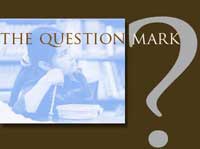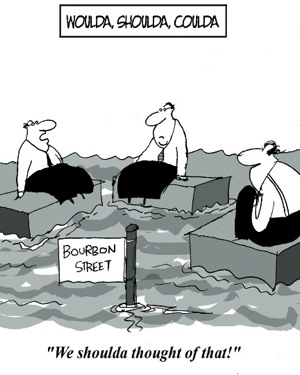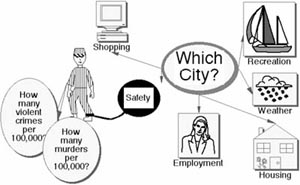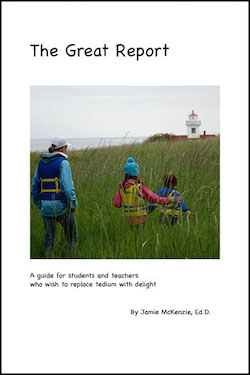Order Jamie's books online with Paypal or a credit card

|
Vol 14|No 4|April|2018
|
|
Important Questions
by Jamie McKenzie (about author)
What are the most important questions facing young people today?
How can we prepare them to tackle such questions as they move through school, study history, read novels, and grapple with a curriculum that sometimes places more emphasis upon memory than understanding?
|
 Photo ©iStock Photo ©iStock |
We all owe a debt of gratitude to Grant Wiggins for inventing and popularizing essential questions back in the 1980s as part of his work with The Coalition of Essential Schools.
For those of us who began teaching in the 60s and 70s, his work inspired many to tilt curriculum toward significance. Instead of students wading through hundreds of pages wondering what meaning school might have, they could wrestle with issues that truly mattered and usually proved to be engaging as well as challenging.
In this article we consider eight types of important questions that can usually be found embedded in the curriculum if one knows to look for them. Some are also questions that relate to everyday concerns.
- Questions about the future
- Questions about choices
- Questions about possibilities
- Questions about character
- Questions about consequences
- Questions about meaning
- Questions about causation
- Questions about truth
Questions about the future
While we cannot hope for clairvoyance, it is possible to hone the skill of looking ahead
to try to forecast what is coming.
- What is the worst that might happen?
- What is the best that might happen?
- What is coming?
- How can I be prepared?

Photo © iStock.com
Students can learn to generate scenarios and estimate the odds of each actually happening.
They can practice this skill while reading novels or the daily news. They can also apply these skills to their own lives and their own futures.
- What is going to happen to Gatsby and Daisy? What are the chances she will leave
her husband to live with Gatsby?
- What is going to happen to stock prices if we get into a trade war with China?

- What are the chances that Congress will pass tougher gun control laws?
- What are my chances of winning acceptance to MIT?
- What would be the benefits of spending a gap year working for the Park Service?
Some people never learn this kind of thinking, sadly, even some of those responsible for disaster planning. It requires, oddly, the capacity to entertain the unthinkable, because the unthinkable happens with annoying frequency and can do great damage to the unprepared.

Questions about choices
Making smart choices requires the skill of evaluation. The student learns to list the criteria that matter the most and then gather data to see how each choice compares on those criteria.
- Which college will be best for me?
- Who would make the best husband for Daisy? Tom Buchanan or Jay Gatsby?
- Who would make the best senator for my state?
- Which immigration plan makes the most sense?
- With my parents spending two years working in China, which city would be best for us?

Data gathering is an essential component (when possible) to make sure the final choice is based on facts rather
than mere speculation, but some choices are more complicated and cannot be resolved with numbers. Medical choices are a prime example, since the efficacy of various treatments cannot usually be predicted with assurance.
  
© Photosphere
- Which is the best treatment?
- Who is the best doctor?
- What is the best way for me to live?
- What is the best way for me to go?
Questions about possibilities
These questions involve wishing, planning and dreaming. Sometimes called "blue sky thinking,"
we hope students will consider more than just the most likely outcomes — that they will sometimes
stretch to entertain options and alternatives that might seem exceedingly ambitious.

Photo © J.McKenzie
Closely associated with questions about the future, these call upon the thinker to test the limits,
use imagination and hypothesize expansively. One must learn to generate possibilities pessimistically
as well as optimistically.
- What are my hopes, fears, wishes and dreams?
- Which of my dreams are realistic possibilities?
- Which of my dreams may be mere fantasies or pipe dreams?
- What happens to a dream deferred?
- Which of Gatsby's dreams were realistic?
- How did Daisy feel about dreams and being a woman?
- What has happened to the American Dream?
Questions about character
Character is usually a combination of history and various traits. In looking at leaders, for example,
we help students to look at their track records as well as their qualities, their quirks and their
personalities. The same with cities. Have they experienced floods, earthquakes or other natural disasters? Are they kind and friendly places welcoming visitors and new residents, or are they cold and harsh with major crime and poverty problems?

Photo © J.McKenzie
- What kind of city is Bucharest? Manhattan? Shanghai? Paris?
- What kind of person was Jay Gatsby? Daisy Buchanan? Tom Buchanan?
- Can I trust this new boy/girl who wants me to date him/her?
- What is the life of a skilled carpenter like? a surgeon? a painter? a truck driver?
- What are the benefits and the side effects for this medication the doctor wants me to take?
- What words best describe the flavor of this Thai dish?
- How did the paintings of French Impressionists differ from the dominant works at that time?
Questions about consequences

Photo © J.McKenzie
Part of looking ahead is asking what might happen once certain choices are made. Students learn to consider what is likely. They conduct a cost/benefit analysis.
- What is likely to happen to me if I am caught speeding? stealing? taking drugs?
- What will happen to U.S. influence with other countries given the foreign policies of the current administration?
- In what ways has Russia paid a price for its activities in Eastern Ukraine and the Crimea?
- In what ways have sanctions proven effective or ineffective when applied to countries like Russia and North Korea?
- What happens to a city like Donestsk (pictured below) in Eastern Ukraine when war breaks out between the Ukrainian government and pro-Russian separatists?

Photo © J.McKenzie
Questions about meaning

Photo © iStock
- Why are we here?
- What am I supposed to do?
- Do I have a calling?
- In what ways was Gatsby a fraud?
- In what ways does a novel like The Great Gatsby speak to our own times?
Questions about causation

- What caused Benedict Arnold to betray the Colonial Army?
- What leads to economic bubbles and their eventual bursting?
- Why do many celebrities suffer from their fame?
- Why are so many people homeless?
- What must a politician do to get elected?
- How will the fats, the sugars and the sodium I consume affect my health and longevity?
- What can I do to reduce the risk of heart disease?
- Why do so many people turn to opioids?
Questions about truth

Photo © J.McKenzie
- What and who can we believe?
- Does truth matter?
- Are white lies dangerous?
- Can the truth hurt?
- Is truth a personal matter?
- What is fake news?
- What is false and what is true?
- What are the best ways to find out the truth?
|
The Great Report
|
 |
You can read sample chapters and see the list of chapters by clicking here.
Order the print version by clicking below.
Order through the mail with a check, click here for the order form.
|
 Photo ©iStock
Photo ©iStock













